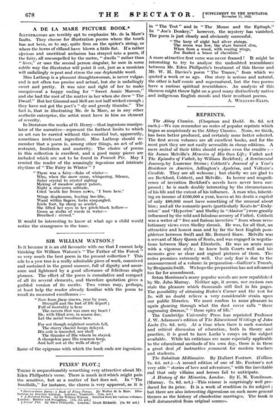REPRINTS.
The Abbey Classics. (Chapman and Dodd. 3s. 6d. net each.)—We can remember no series of popular reprints which began as auspiciously as the Abbey Classics. None, we think, has been better produced, and certainly none better selected. The first seven volumes are all excellent books, and for the most part they arc not easily accessible in cheap editions. A mere recital of their titles should rejoice even the erudite :- Sir James Melville's Memoirs of His Own Life; Vathek and The Episodes of Vathek, by William Beekford ; A Sentimental Journey, by Laurence Sterne; Cobbett's Journal of a Year's Residence in America, Adling,ton's Apuleius, and Voltaire's Candide. They are all welcome ; but chiefly we are glad to see Beckford, Cobbett, and Melville. In horror and magnifi- cence of invention Beckford's novels have never been sur- passed ; he is made doubly interesting by the circumstances of his life and the extent of his influence. A man who, inherit. ing an income of £100,000 a year, leaves at his death a capital of only £80,000 must have something of the unusual about him ; and all the romantic poets (particularly Keats in" Endy- mion" and "Hyperion" and Shelley in "Alastor ") were greatly influenced by the wild and fabulous scenery of Vathek. Cobbctt was a writer of " free and furious invective " from whose revo- lutionary views even Shelley shrank. He was, for all that, an attractive and honest man and by far the best English pam- phleteer between Swift and Mr. Bernard Shaw. Melville was a servant of Mary Queen of Scots, and was engaged in negotia- tions between Mary and Elizabeth. He was an acute man with a vigorous style ; he knew both Courts well and his memoirs give us clear and orginal pictures of them. The series promises extremely well. Our only fear is due to the announcement of a volume in preparation—Gulliver's Travels, by Benjamin Swift. We hope the preparation has not advanced too far for amendment.
Seton Merriman's many popular novels are now republished by Mr. John Murray. Neither age, it seems, nor custom can stale the pleasure which thousands still find in his pages. The possibility of obtaining Roden's Corner and the rest for 2s. will no doubt relieve a very considerable strain. upon our public libraries. We must confess to some pleasure in again glancing through what the dust cover calls " these engrossing dramas," " these epics of life."
The Cambridge University Press has reprinted Professor J. W. Adamson's edition of The Educational Writings of John Locke (7s. 6d. net). At a time when there is such constant and critical discussion of education-, both in theory and practice, it is good to have Locke 's essays on the subject available. While his criticisms are more especially applicable to the educational methods of his own day, there is in them a great deal of instructive comment for modern teachers and students.


























































 Previous page
Previous page